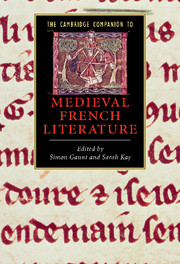Book contents
- Frontmatter
- Introduction
- Part I What is a Medieval French Text?
- Part II What is a Medieval French Author?
- Part III What is the Value of Genre for Medieval French Literature?
- Part IV How can we read Medieval French Literature Historically?
- 13 Feudalism and kingship
- 14 Clerks and laity
- 15 The marital and the sexual
- 16 Others and alterity
- Appendix: Reference works for Old and Middle French
- Bibliography of medieval French texts
- Suggested Further Reading
- Index
- Series List
16 - Others and alterity
from Part IV - How can we read Medieval French Literature Historically?
Published online by Cambridge University Press: 28 March 2009
- Frontmatter
- Introduction
- Part I What is a Medieval French Text?
- Part II What is a Medieval French Author?
- Part III What is the Value of Genre for Medieval French Literature?
- Part IV How can we read Medieval French Literature Historically?
- 13 Feudalism and kingship
- 14 Clerks and laity
- 15 The marital and the sexual
- 16 Others and alterity
- Appendix: Reference works for Old and Middle French
- Bibliography of medieval French texts
- Suggested Further Reading
- Index
- Series List
Summary
Medieval French literature is replete with alien and exotic beings: magical creatures, such as fairies and werewolves; marvellous or savage beings, such as giants and wild men; and ethnically or culturally different humans, such as Saracens. While there might seem initially to be a great difference between ordinary humans of a different culture, and marvellous creatures of an entirely different order of being, in fact this difference is often elided in medieval texts. In the Pseudo-Turpin Chronicle, for example, the Saracen champion that Roland fights is a Syrian Muslim who calls upon 'Mahomet' at the moment of his death; he is also a giant with the strength of twenty men and skin so tough that it cannot be pierced with a sword. This chapter will examine selected examples of Old French texts involving fairies, giants, and Saracens. And while the aura of otherness surrounding magical beings may be more exciting, more exotic, and more dangerous, in the end all of these stories serve a common purpose, that of probing both the dangers and the delights of cross-cultural and inter-ethnic contact.
Attempted unions between humans and fairies figure in numerous medieval French texts, and are always presented as both alluring and problematic. Early examples can be found in the twelfth-century Lais of Marie de France. In Lanval, for example, the eponymous knight, a bit of a loner at Arthur’s court, is summoned by a fairy who offers him her love on condition that the relationship remain completely secret. This arrangement is successful for a time, though it has the effect of isolating Lanval, who constantly seeks opportunities to evade his companions so that he can enjoy the company of the fairy. The conflict comes to a head when Lanval gets into an altercation with the queen, who has attempted to seduce him, and tells her that she is less beautiful than his lady, or indeed, than his beloved’s least servant.
- Type
- Chapter
- Information
- The Cambridge Companion to Medieval French Literature , pp. 238 - 250Publisher: Cambridge University PressPrint publication year: 2008

